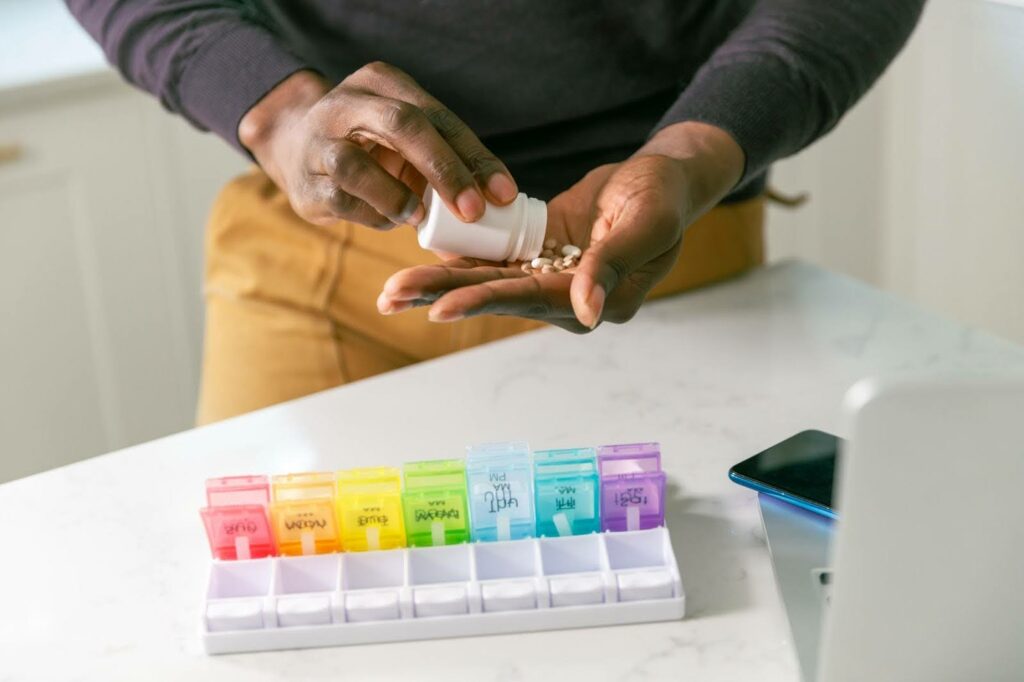Tips for Medication Management for Seniors
Effective medication management is crucial for seniors to stay healthy and avoid complications. Older adults frequently encounter challenges such as juggling multiple prescriptions, memory lapses, and understanding potential drug interactions.
This guide offers practical tips to simplify and enhance medication management for seniors while highlighting the importance of working with health care professionals and involving family members or caregivers. By adopting these strategies, seniors can better manage their medications, avoid potential risks, and ensure a higher quality of life.
Understanding the Challenges
As people age, they often take more medications to manage chronic conditions such as high blood pressure, diabetes or arthritis. This increase in prescriptions can lead to challenges like:
- Polypharmacy: The use of multiple medications increases the risk of interactions.
- Memory Issues: Seniors may forget doses or take medications incorrectly.
- Side Effects: Older adults are more sensitive to medications due to changes in metabolism.
- Over-the-Counter (OTC) Risks: Medications like diphenhydramine (found in products like Benadryl or those labeled “PM”) can have severe side effects, including confusion, dizziness, and constipation.
- Medication Expiry: Medications may go unused and expire, leading to safety concerns when taking outdated drugs.
- Understanding Label Instructions: The small print on medication labels can be hard to read, leading to confusion about how and when to take the medication.
Best Practices for Medication Management
Effective medication management is essential for seniors to stay healthy and avoid complications. Below are some key strategies to help ensure safe and effective medication use:
- Maintain an Updated List
- Keep a current list of all prescriptions, OTC medications, and herbal remedies.
- Include details like dosage, purpose, and potential side effects.
- Share the list with your primary care doctor and specialists to avoid conflicting prescriptions.
- Regular Medication Reviews
- Schedule periodic check-ins with a health care professional to assess medication efficacy and adjust for any health changes.
- Discuss potential interactions between drugs, especially those like diphenhydramine that can react with tranquilizers or barbiturates.
- Address symptoms like confusion or dizziness promptly.
- Proper Storage and Organization
- Use pill organizers or dispensers for daily doses.
- Clearly label medications with large, easy-to-read fonts.
- Store medications in a cool, dry place, away from children and pets.
- Adherence Strategies
- Establish a routine by taking medications at the same time daily, aligning with habits like meals.
- Set alarms or use reminder apps to stay on track.
- Avoid mixing medications with food or beverages unless directed by a health care provider.
- Recognizing and Preventing Side Effects and Interactions
- Watch for signs of side effects, such as confusion, dizziness or behavioral changes.
- Be cautious with OTC medications like diphenhydramine, which can exacerbate cognitive issues in seniors.
- Avoid medications contraindicated for specific conditions, such as liver disease, without consulting a doctor.
- Role of Caregivers and Family Members
- Enlist family members to help monitor medication schedules and refill prescriptions.
- Foster open communication about challenges in adhering to regimens.
- Create a shared system to ensure medications are taken as prescribed.
- Technological Aids
- Explore medication reminder apps or automated dispensers.
- Use digital health records to track prescriptions and refill schedules.
- Share access to apps with family members or caregivers for added support.
- Planning for Emergencies
- Keep an emergency supply of medications.
- Have a plan for accessing prescriptions during natural disasters or travel disruptions.

How Senior Living Communities Help With Medication Management
Communities like Notre Dame Health Care provide professional support to make medication management easier. Services include:
- Access to nursing staff and contracted pharmacies
- Regular health monitoring to adjust medications as needed
- Support programs to reduce stress for seniors and their families
Understanding the Risks of Prescription Drug Misuse
Older adults may unintentionally misuse medications due to changes in their bodies’ abilities to process drugs. Warning signs of misuse include:
- Defensive behavior when asked about medications
- Taking higher doses than prescribed
- Sneaking or hiding medications

Comprehensive Medication Management at Notre Dame Health Care
At Notre Dame Health Care, we understand the importance of effective medication management in promoting senior health and well-being. Our dedicated team provides personalized support, ensuring medications are properly organized, reviewed, and administered to meet each resident’s unique health needs.
With access to on-site health care professionals, medication reviews, and advanced monitoring systems, seniors in our Assisted Living community and their families can have peace of mind knowing their health is in expert hands. In our Long Term Care & Rehabilitation Center, medication management is fully handled by our nursing staff, ensuring that all medications are carefully administered according to each resident’s care plan—offering a higher level of oversight than in Assisted Living.
Learn more about Notre Dame Health Care’s commitment to holistic senior health, including our comprehensive medication management services. Call us today at (508) 258-9156 to schedule a visit and discover how we support wellness in every aspect of our residents’ lives.